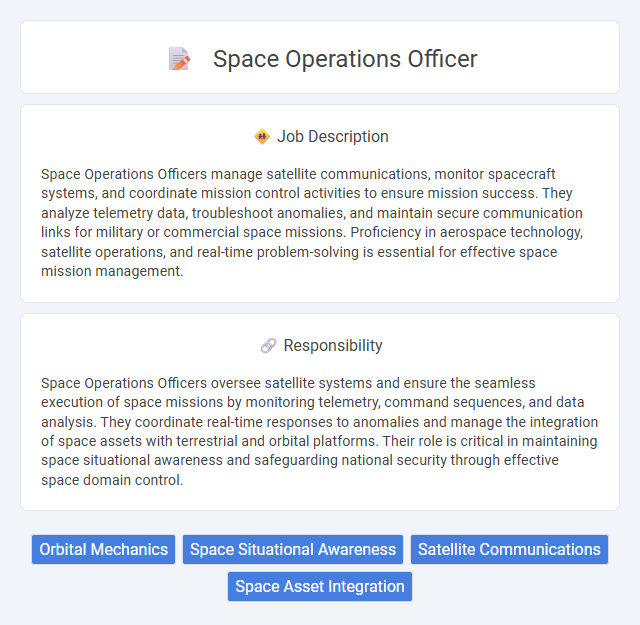
Space Operations Officers manage satellite communications, monitor spacecraft systems, and coordinate mission control activities to ensure mission success. They analyze telemetry data, troubleshoot anomalies, and maintain secure communication links for military or commercial space missions. Proficiency in aerospace technology, satellite operations, and real-time problem-solving is essential for effective space mission management.
Individuals with strong analytical skills, adaptability, and the ability to operate under high-pressure conditions are likely suitable for a Space Operations Officer role. The job may demand high mental resilience and precise decision-making, which implies that candidates who thrive in structured, mission-critical environments may have a higher probability of success. Those lacking attention to detail or the capacity to manage complex technical information might find this position challenging.
Qualification
Space Operations Officers require a strong background in aerospace engineering, physics, or a related STEM field, often holding a bachelor's or master's degree. Expertise in satellite communications, orbital mechanics, and space situational awareness is essential for effective mission planning and real-time operations management. Candidates must demonstrate proficiency in using advanced simulation software and maintain a security clearance for handling classified information.
Responsibility
Space Operations Officers oversee satellite systems and ensure the seamless execution of space missions by monitoring telemetry, command sequences, and data analysis. They coordinate real-time responses to anomalies and manage the integration of space assets with terrestrial and orbital platforms. Their role is critical in maintaining space situational awareness and safeguarding national security through effective space domain control.
Benefit
A Space Operations Officer likely benefits from unique career opportunities involving satellite control, mission planning, and space surveillance, offering specialized skills in high-demand sectors. The role probably provides access to advanced technology and collaboration with aerospace experts, enhancing professional growth and expertise. Potential benefits may also include competitive salaries, government or military support, and opportunities for advancement in a cutting-edge field.
Challenge
Space Operations Officer roles likely involve complex problem-solving under high-pressure scenarios, requiring quick decision-making and precise execution. The challenge of managing satellite systems and coordinating mission activities demands strong technical expertise and an ability to anticipate and mitigate risks. Navigating unpredictable space environments and maintaining operational integrity may further test resilience and adaptability.
Career Advancement
Space Operations Officers manage satellite systems, coordinate space missions, and analyze orbital data to ensure mission success. Career advancement often includes promotions to leadership roles such as Space Operations Flight Commander or Space Systems Director, requiring advanced technical expertise and strategic planning skills. Mastery of space technologies, alongside professional military education, enhances opportunities for higher-level positions within aerospace and defense sectors.
Key Terms
Orbital Mechanics
A Space Operations Officer specializing in Orbital Mechanics manages spacecraft trajectories, ensuring precise orbital insertion, station-keeping, and collision avoidance. Expertise in satellite navigation systems, orbital perturbations, and maneuver planning is essential for mission success. Proficiency in simulation software and real-time telemetry analysis supports effective decision-making in dynamic space environments.
Space Situational Awareness
Space Operations Officers specializing in Space Situational Awareness (SSA) monitor and analyze the position, trajectory, and status of satellites and space debris to ensure the safety and effectiveness of space missions. They utilize advanced radar, optical sensors, and data integration tools to detect potential threats such as collisions or interference in Earth's orbit. Expertise in orbital mechanics and real-time tracking technologies is critical for maintaining space domain awareness and supporting decision-making processes in both military and commercial space operations.
Satellite Communications
Space Operations Officers specializing in satellite communications manage and monitor satellite systems to ensure reliable data transmission across global networks. They coordinate satellite launch, deployment, and maintenance activities while analyzing telemetry data to optimize signal integrity and bandwidth efficiency. Expertise in RF communications, orbital mechanics, and cybersecurity protocols is essential for maintaining uninterrupted satellite connectivity and supporting military or commercial space missions.
Space Asset Integration
Space Operations Officers specialize in space asset integration, ensuring the seamless coordination and deployment of satellite systems and space-based technologies. They manage the alignment of spacecraft capabilities with mission objectives, optimizing operational efficiency and mission success rates. Proficiency in orbital mechanics and systems engineering is essential for maintaining real-time situational awareness and asset interoperability.
 kuljobs.com
kuljobs.com